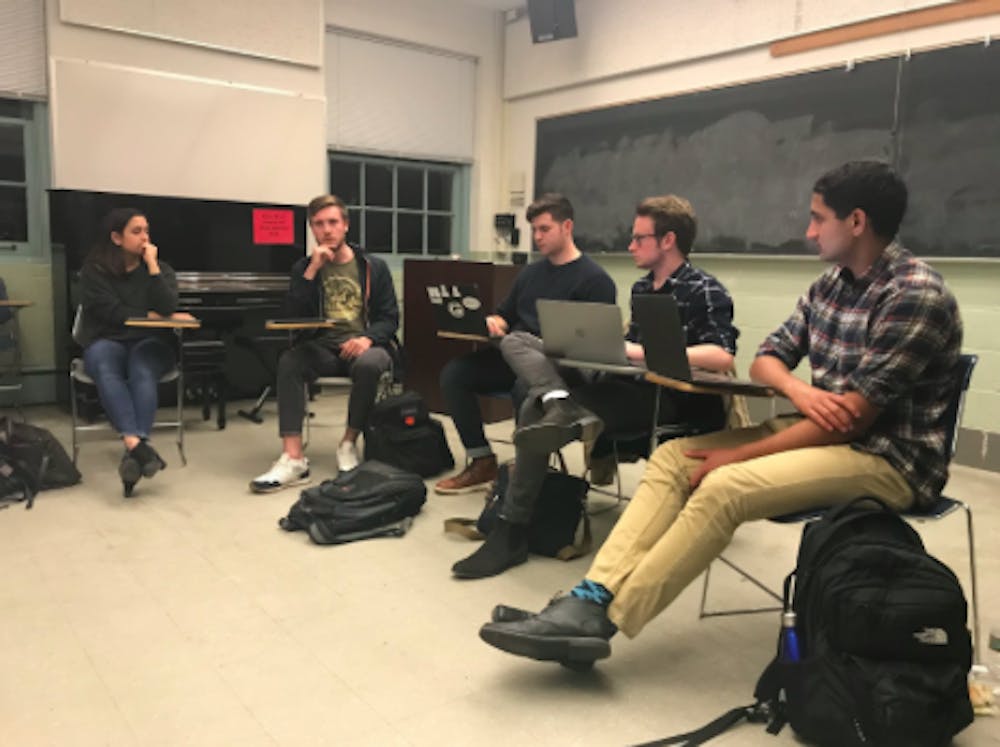Students discussed the current state of global climate change agreements and future environmental solutions at a roundtable discussion on Wednesday. IDEAL, a student organization that promotes both nonpartisan and bipartisan civic engagement on campus, hosted the event.
In his opening remarks, junior Matthew Goynatsky emphasized the growing dangers of ignoring the threat of climate change.
“[It] is no longer an issue of the future, of generations down the line. It is a clear and present danger to our ecosystem and many people around the world,” he said.
Members outlined a brief history of international climate change commitments, including the Kyoto Protocol and the current Paris Agreement. Noting the shortcomings of both agreements, such as the lack of accountability and the recent withdrawal of major polluters, China and the U.S., they asked the attendees to weigh in on what an ideal commitment to climate change would look like.
Junior Rob Cortes voiced that he thinks there is very little chance of creating an optimal agreement.
“A large part of the reason why these protocols between countries don’t work is because their goals aren’t aggressive enough,” Cortes explained.
Freshman Sophia Lipkin agreed and elaborated on the economic improbability.
“In order to have any sort of effect on climate change you need to basically disrupt huge sectors of all countries’ economies. I don’t know any country willing to do that,” she said.
However, some students, including juniors Sydney Thomas and Goynatsky, held out hope for a solution in the form of strong economic incentives.
Thomas explained that states will enter into climate change agreements as the effects of global warming and pollution became more apparent.
“As climate change progresses and as things get worse, it will inevitably end up affecting the economy — the question is just how far out and how far ahead different states and actors are willing to look,” Thomas explained. “In a very real way it would affect the economy; it would affect agriculture.”
Goynatsky agreed and added that although many countries might intend to use less fossil fuels, it is difficult to decrease a carbon footprint if they depend entirely on coal as an energy source.
“They would need incentives; they would need something to offset giving up that major portion of their economy,” he said
The group also discussed their predictions about how the previous day’s midterm election results will impact the nation’s political discourse and policy changes concerning climate change.
Many voiced that the prophesized “blue wave” of Democratic wins would not be as large as some Democratic pundits had hoped, but it did result in a flipped House of Representatives. The newly divided Congress posed the question of the effect of anticipated Congressional gridlock on legislation geared toward addressing climate change.
Lipkin argued that Democrats will be able to pass some new actions against climate change in Congress.
“The Democrats have pledged to increase at least awareness for climate change. What that’s going to look like depends on how willing the Senate republicans work with them. I’m assuming it’s going to be increased incentives for green energy resources and an attempt to get certain economies to start using green energy,” she said
Goynatsky argued that the polarization, and an aversion to compromise, will instead pose insurmountable barriers to the passage of effective climate change legislation.
Many students feel that the biggest predictor of the success of legislation addressing climate change will be financial lobbying.
Junior Devanshu Singh analyzed the changing power balance in climate change-related lobbying.
“I would say that, generally speaking, a lot of green companies have been growing in their market value over the past couple of years while coal continues to be an increasingly less viable business,” Singh said. “However, it still holds a special cultural position, especially in states like West Virginia where it historically provided lots of jobs. Now, the bigger problem is natural gas companies that use fracking to get a large amount of oil.”
The conversation then returned to ideas on reform on the international scale. Freshman Elly Ren recognizes the need for developing countries to utilize renewable energy during industrialization but understands how countries such as India and China would find a requirement to use more expensive renewables economically unfair.
“They look to the U.S. and the U.S. is still using coal and oil and they also industrialized heavily on oil and coal,” Ren said. “They just feel like, ‘Why are we obligated to switch to renewables, which is expensive and we don’t have the infrastructure, when the U.S. isn’t even doing it?’”
Junior Mickey Sloat felt that this event was particularly important after the recent midterm elections.
“Climate change is really on the forefront of the most globally important issues. I think it’s something that as a world we can agree on, and I think that bringing attention to it is important. I’m especially looking forward to seeing how the issue will play out after the midterms,” he said.





